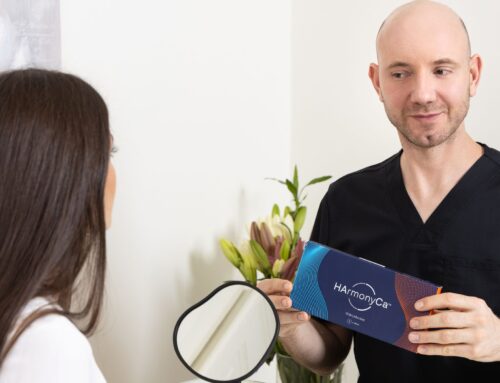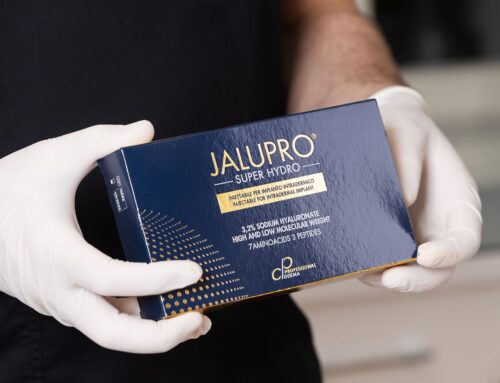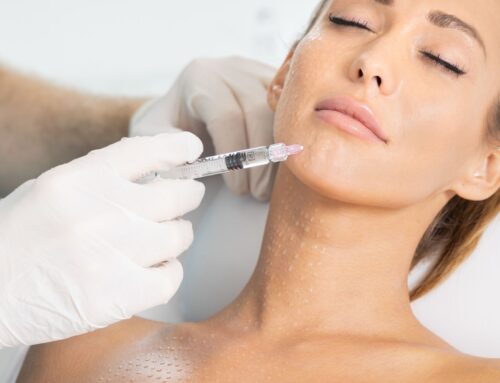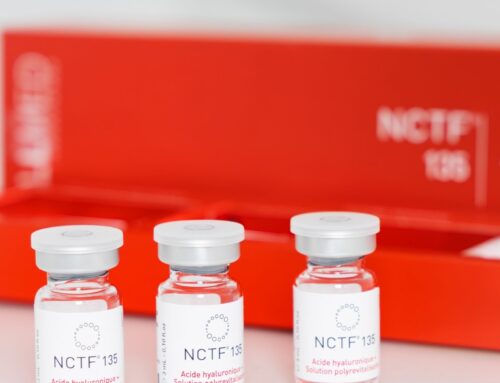What is collagen, why is it important for our skin, why does it disappear and what treatments and methods of intake are the best to replace it.
Collagen has been a popular topic of discussion for many years, and today more than ever, so we have no doubt that you have already heard about it. But, you may not have paid attention to what exactly collagen is, and more importantly – why it is important when we talk about beautiful, healthy and well-groomed skin. Maybe you haven’t thought about collagen, because the signs of aging are still not visible on your skin, and maybe you just didn’t know that it is the key to tight, firm and glowing skin. Whatever the reason, it’s time to learn all about this most important protein that keeps the skin of the face and body looking youthful.
In the rest of the text, we answer all the questions about collagen, and after reading it, you will know exactly how your skin can become firm, tight, smooth and without signs of aging! So let’s start, because the clock is ticking, and aging along with it.
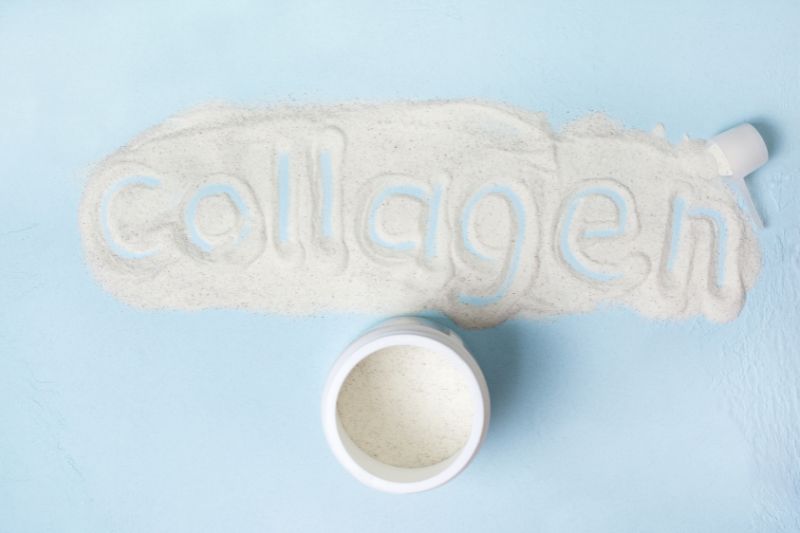
What is collagen?
Collagen is one of the most important proteins in our body and comprises about 40% of all the proteins that make up our body. It is the main building element when we talk about connective tissue . Collagen is responsible for the condition and quality of our skin, but also bones, muscles, ligaments, hair, nails and eyeballs.
It is, therefore, about the most important protein of the human body, which is distributed throughout the body.
When it comes to skin, collagen alone makes up about 80% of our dermis. Its presence makes our skin firm, smooth and without signs of aging – fine lines, wrinkles and deep wrinkles! The word collagen comes from the Greek word kólla , which means “glue”, because it glues and holds in place everything that we constantly “tear down”, more precisely, we move, bend, indent… For example, with facial expressions we make indentations in the skin and stretch it skin. Thus, when we raise our eyebrows and wrinkle the skin on the forehead, we have bent and dented it at the places of the wrinkles. Collagen and elastin enable its correction and return to its previous state.
Collagen – the main support for the skin
Collagen can easily be explained as a support for our skin to stay firm, just like the pillars that hold a building together and prevent it from collapsing. Collagen is the pillars, and the flat plate that the pillars hold is our skin in this metaphor. The pillars hold, and the slab stands straight. When the pillars give way or break, the plate falls, that is, our skin gets wrinkles, relaxes, loses its elasticity and starts to “hang”.
The collagen found in our body naturally declines over time. The latest scientific research has shown that the state of collagen in the body actually determines a person’s biological age. Changes are first noticed on the skin, where fine lines first appear and then wrinkles that deepen over time. The elasticity and tightness of the skin is lost, and aging progresses progressively.
Why is collagen important?
As we have already mentioned, youth and biological age depend on the amount of collagen in the body. It plays a key role when we talk about beauty, but also health!
Collagen is found naturally in our body and is constantly renewed. Over time, this process slows down and there is a decrease in collagen in the body. As a result, wrinkles appear, sagging facial tone and other visible signs of aging on the face and body. Collagen is produced by cells called fibroblasts. In addition to collagen, fibroblasts also synthesize elastin, the protein responsible for skin elasticity, as well as hyaluronic acid, necessary for skin hydration and plumpness. Collagen, elastin and other proteins make up the skin’s network and give it a firm, firm and toned appearance.
Collagen – and for muscles
Collagen is also important for the proper functioning of muscles, bones and ligaments. A decrease in the amount of collagen often leads to pain in the joints due to the reduction of cartilage and the weakening of ligaments and muscles.
What types of collagen are there?
There are as many as 28 different types of collagen in our body. 80-90% of the collagen in the skin is type I, and 10-15% is collagen type III. Type I collagen, in addition to being found in the skin, is also found in tendons, blood vessels, organs and bones. To a lesser extent, collagen type III is also present in these tissues. Type II collagen is found in cartilage.
Manufacturers of collagen products often point out that the product contains a certain type of collagen. For example, it is stated that products with collagen type I are intended for the skin, and those with type II for cartilage. However, collagen in supplements is “chopped” into peptides and amnoacids. Given that all types of collagen are composed of the same peptides and amino acids, we will conclude that the choice of type of collagen in the product is not of crucial importance.
Collagen against wrinkles and sagging skin
The main fighter in our skin to preserve its youthful appearance is precisely collagen.
Two processes run parallel in the skin: the creation of new collagen thanks to fibroblasts and the breakdown of damaged collagen by enzymes called matrix metalloproteinases (MMP). When we are young, damaged collagen breaks down and new collagen is quickly created. This process is very effective while we are young. The peak in collagen synthesis is around 25. years, after which the skin begins to lose collagen %-1,5% times a year. Science has shown that in the next 4 decades, about 25% of collagen is lost. A 75-year-old person has only ¼ the amount of collagen of a 19-year-old. That’s why it’s crucial to compensate for its deficiency in order to maintain resilient and strong skin that looks youthful.
What accelerates the breakdown of collagen?
As we said, the reduced amount of collagen is a natural phenomenon, but in some people this deficit is more progressive. The reason lies in the many factors that affect the reduction of collagen, namely: air pollution, exposure to harmful sunlight, smoking, stress, excessive physical activity and exhaustion, inadequate nutrition, high sugar intake and genetic factors.
The aforementioned factors lead to the creation of free radicals in our skin, activate enzymes that break down collagen (matrix metalloproteinases) and damage collagen fibers. It is important to note that no supplement or treatment can replace a quality lifestyle, that is, an adequate diet with lots of vegetables, without saturated fats, with as little sugar as possible and, of course, without smoking. Of course, it is important to emphasize that adequate sleep is necessary for the restoration of our collagen and the organism as a whole, and we must not forget adequate physical activity. It is crucial to preserve muscle volume with aging, which is only possible with regular physical activity and adequate protein intake. In addition to beauty, a healthy diet and regular physical activity have a beneficial effect on the entire organism and prevent the occurrence of many diseases.
How to slow down collagen loss?
As with most things in life that have a good result behind them, there are no shortcuts here either. But that’s why we have provided you with a short guide with which you will successfully replace the colleague in the body or prevent its deterioration. Compensation and stimulation are done on both levels – internally and externally.
You will best preserve collagen if you protect your skin from harmful UV radiation every day. Therefore, a cream with a protective factor is mandatory every day, and not only during the summer months.
Daily skin care should contain products that have antioxidants, which neutralize free radicals and stimulate the creation of new collagen. In the first place there is vitamin C, then vitamin E, ferulic acid, coenzyme Q10, pycnogenol, etc. The most powerful substance that stimulates collagen production when applied to the skin is definitely retinol. There is no cosmetic suspension with more scientific evidence that it stimulates collagen synthesis and slows down aging.
In addition to nutrition, we can also introduce nutritional supplements, which are supplements that contain collagen. If you opt for collagen-based nutritional supplements, it is of crucial importance that it contains hydrolyzed collagen, i.e. collagen peptides, and that the daily dose of collagen is 10g.
Regular exercise and healthy habits enable a better exchange of cellular substances, oxygen flow in the tissue and preservation of muscles.
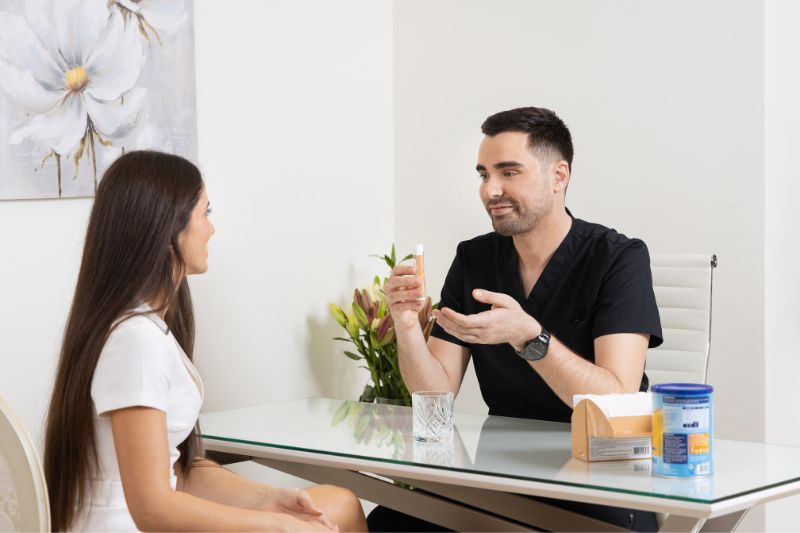
Which food contains the most collagen?
Beef – collagen from beef is obtained from the skin, bones and muscles, and it is type I and III collagen that helps the body to create its own collagen.
Chicken is excellent for cartilage regeneration, because it contains type II collagen. Fish – many consider fish to be the best quality collagen, because it is easily absorbed, and it is also rich in other amino acids, so it has a positive effect on the skin, joints, bones and other elements in the body.
Eggs – collagen is found in egg white and although there are several types of collagen, the most common is type I, which helps with connective tissue. Stone fruits and green vegetables are excellent choices for vegetarians and vegans because these foods stimulate collagen synthesis.
Food rich in vitamin C, which as a powerful antioxidant plays a major role in collagen synthesis, because it eliminates free radicals.
Creams, serums and cosmetic products with collagen
Collagen has been used in cosmetics for years with more or less success. Many cosmetic companies have a great challenge to make products with collagen, because the molecule of this protein is large. With external application through creams and serums, it cannot be introduced into the skin, but remains on its surface, binds water and improves hydration. There are studies that indicate that hydrolyzed collagen, i.e. collagen peptides can to some extent be resorbed into the deeper layers of the skin and stimulate fibroblasts to synthesize collagen. So far, we don’t have enough evidence that this actually happens to a sufficient extent to have a beneficial effect on the skin.
At the moment, we are not sure whether collagen in cosmetic products has a greater effect on skin rejuvenation besides improving hydration. Which doesn’t mean you can’t use collagen peptide creams, but keep in mind that it’s much more important to use SPF, retinol, and antioxidants.
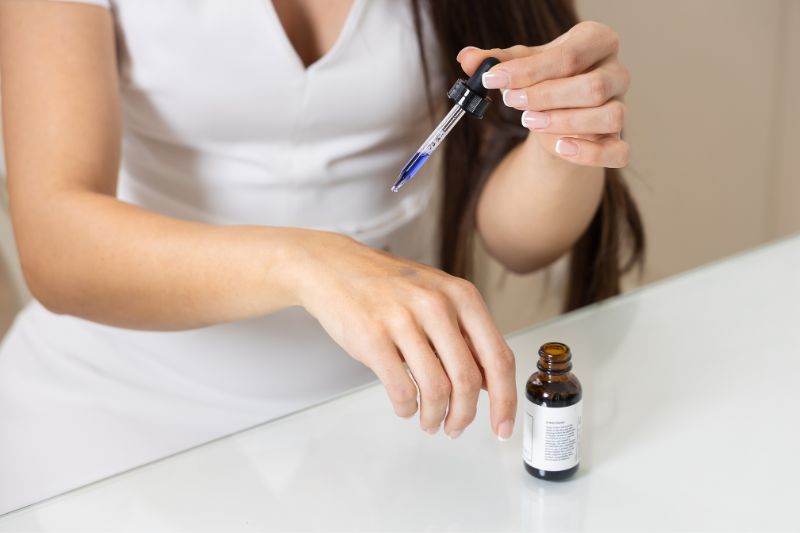
collagen supplements?
Collagen is a large molecule consisting of peptides (peptides are small molecules that are formed by combining several amino acids). Collagen-based nutritional supplements contain hydrolyzed collagen. It is collagen “cut” into peptides and amino acids, which are quickly and easily resorbed from our digestive system.
After taking a food supplement based on hydrolyzed collagen, a large amount of collagen peptides are rapidly resorbed. They quickly reach all tissues, including the skin and fibroblasts that produce collagen, elastin and hyaluronic acid. Studies have shown that collagen peptides stimulate fibroblasts to synthesize more collagen, elastin and hyaluronic acid. The process of resorption of collagen from food is slower due to the “shredding” of collagen into peptides, as well as their smaller amount found in food compared to supplements.
THE MOST EFFECTIVE SUPPLEMENTS
On our market there are many supplements with hydrolyzed collagen, in capsules, in powder or liquid form.
The effectiveness of these forms is quite similar, but the most important thing is the dose of collagen. A dose of at least 10g of collagen (10,000 mg) was used in the studies. Therefore, in order to realize all the benefits of collagen, we must enter that amount. Powdered collagen products usually contain 8-10g of collagen per dose, ampoules 5-10g, and capsules usually only 1g (1000mg). It doesn’t matter which form you choose, but the dose is key. Keep in mind that if you drink collagen in capsules, 1 or 2 capsules are not enough and you will not get the benefits. Along with collagen, it is recommended to take vitamin C, which is necessary in the process of collagen synthesis.
Some of the products that meet the stated conditions are:
- Colnature collagen – 10g of hydrolyzed collagen, hyaluronic acid, magnesium citrate and vitamin C.
- CH Alpha collagen – 10g of hydrolyzed collagen in ampoules with a pleasant taste.
- Collacare liquid collagen, fish collagen enriched with vitamins, hyaluronic acid, copper and zinc.
Effect of hormones on collagen
Pregnancy
During pregnancy, there is a rapid and significant stimulation of collagen synthesis. What is problematic is the rapid decline in the amount of collagen after childbirth, which is why collagen supplementation is advised after childbirth, and especially during breastfeeding. Supplementing with collagen is beneficial in helping the skin to return to its previous state. In addition to the skin, the addition of collagen will also help stressed joints and ligaments.
Menopause
It has been shown that in menopause there is a decrease in collagen synthesis, and consequently in the thickness of the skin. On average, women in menopause lose 2.1% of collagen per year, while skin thickness decreases by 1.13% per year. Hormone replacement therapy helps restore collagen and eases many menopausal complaints, such as reducing hot flashes and night sweats, mood disorders, reduces vaginal dryness, etc. Also, this therapy reduces cardiovascular risk and the risk for osteoporosis, but it also carries certain risks, which is why not all women are candidates. When entering menopause, in addition to various treatments that can help you preserve your skin, a detailed examination by an endocrinologist and an assessment of the benefits and possible risks of hormone replacement therapy is important.
What treatments stimulate collagen growth?
Most treatments achieve at least part of their effect by stimulating collagen synthesis. In the following table, we tried to systematize the treatments according to their effect on collagen formation, advantages and disadvantages. We will rank the treatments in order of effectiveness, starting with those that stimulate collagen growth the least. Keep in mind that this does not mean that treatments that stimulate less collagen synthesis are ineffective, as there are other ways to affect skin rejuvenation, such as improving hydration, replenishing volume, etc.
Important: We emphasize that this systematization of treatments according to the effect on collagen synthesis represents the author’s exclusive opinion based on the currently available data and our work experience, since we offer all the mentioned treatments.
Mild stimulation of collagen synthesis
| Treatment | Advantages | Flaws |
|---|---|---|
| Superficial chemical peels | No recovery. | Frequent repetition. They seem superficial. |
Most chemical peels – glycolic, milky or salicylic – act on the epidermis, the superficial layer of the skin. They renew it, removing dead cells and leaving the skin radiant and smooth to the touch. They do not require recovery, and the disadvantage is that it is necessary to repeat the treatment frequently, for 7 to 10 days.
Medium strong effect on collagen synthesis
| Treatment | Advantages | Flaws |
|---|---|---|
| Non-invasive radio waves | No recovery. | A series of 3-6 treatments is required. Maintenance 2 to 3 times a year. |
| Dermapen | A short recovery. | A series of treatments is required. |
| Skinboosters | A short recovery. Fast effect. | It must be repeated every few months. |
| Non-ablative lasers Er:Glass , Nd:YAG , etc. | No recovery/fast recovery. | A series of treatments is required. Maintenance 1 to 2 times a year. |
| Combination of non-ablative lasers with ablative Er:YAG | Visible results even after one treatment. | Recovery 2-5 days. Repetition may be necessary. |
| TCA chemical peel | Visible results after 1 treatment. | Recovery 6-7 days. Repetition may be necessary. |
Non-invasive radio waves (probe without needles) instantly contract existing collagen resulting in slight tightening. They stimulate the synthesis of collagen in the deeper layers of the skin. They require a series of treatments, the number of which is determined based on the patient’s skin condition, indications and requirements, and the achieved results must be maintained a couple of times a year.
With dermapen (microneedling), the effect depends on the length of the needles, so it can only work on the superficial layer of the skin when it is a cosmetic treatment. If it is a medical treatment, the length of the needles can be up to 3mm, which stimulates collagen synthesis in the deeper layers. For an adequate effect, a series of treatments is required, which means that it takes time and patience to achieve them.
The main effect of skinbusters ( Jalupro, Profhilo, Volite, etc.) is improving the quality and deep hydration of the skin. By replenishing hyaluronic acid, the skin becomes smoother and “fuller”. In addition, skinbusters also affect the creation of collagen in the skin.
Non-ablative lasers are extremely popular because treatments can be done all year round. They reach the dermis, the deeper layer of the skin, without damaging the surface layer of the skin. To achieve the desired effect, it is necessary to do a series of treatments, which in addition to patience requires higher costs.
We often use non-ablative lasers in combination with ablative fractional Er:YAG laser . In addition to collagen synthesis, they even out the complexion, reduce hyperpigmentation and wrinkles, and slightly tighten the skin. Depending on the condition of the skin, repetition may be necessary, while the results are visible even after one treatment.
TCA chemical peeling reaches the deeper layers of the skin where it stimulates strong collagen production. In addition, this peel softens or removes irregularities such as fine lines, photodamage and acne scars. Recovery from a TCA peel is about 6 to 7 days, the skin peels and redness may be present. Acne scars and scars require repeated treatments, while hyperpigmentation usually requires one treatment.
Strong and long-lasting stimulation of collagen synthesis
| Treatment | Advantages | Flaws |
|---|---|---|
| Fractional CO2 laser | Stimulation of collagen synthesis for up to 12 months after just one treatment. | Recovery 7 days. |
| Morpheus8 | Long-term stimulation of collagen synthesis, moderate tightening effect. | Repeating the treatment 3 times at intervals of about a month. Recovery 2-3 days. |
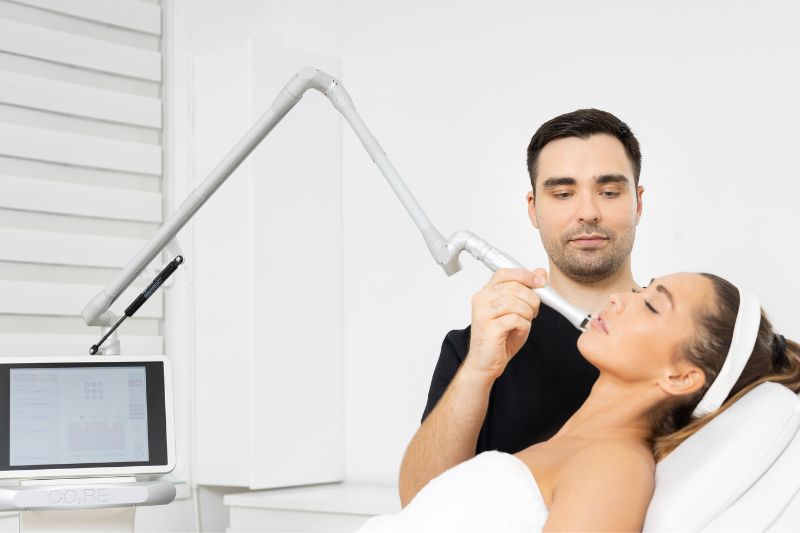
co2 laser
In addition to stimulating collagen, the fractional CO2 laser removes hyperpigmentation, significantly reduces enlarged pores and deep acne scars, as well as scars from burns, surgical interventions and injuries. By creating collagen and elastin, wrinkles become shallower, especially those around the lips and under the chin, which are resistant to most other treatments. The CO2 laser achieves an exceptional effect on the lower eyelids where it reduces excess skin and slightly lifts the upper eyelids. The skin tightening effect is particularly noticeable in patients with thinner skin and less subcutaneous tissue. In addition to facial rejuvenation, the neck, décolletage and hands can be treated. Effects are seen after just one treatment.
The number of required treatments varies according to the indications and the condition of the skin. For the treatment of scars and deep photodamage, multiple treatments are required. In patients with rosacea, the CO2 laser must be combined with vascular lasers to prevent long-term redness. You can read all about the CO2 laser here .
Morpheus 8
Morpheus 8 is a device based on the technology of simultaneous action of radio waves and microneedles. In the superficial layers, it reduces photodamage, pores and fine lines. In the deep layer of the skin, it leads to long-term stimulation of collagen synthesis, achieving a moderate tightening effect. It is ideal for reducing excess fatty tissue and skin in the lower third of the face and underarms. When it comes to the skin of the body, it slightly to moderately tightens the sagging skin of the abdomen, upper arms, knees, etc.
Collagen stimulator or hyaluronic fillers?
In addition to the filling effect, hyaluronic fillers also have an effect on collagen stimulation. Part of that effect is achieved by mechanical pressure on fibroblasts, which stimulates collagen synthesis. Also, hyaluronic acid to a certain extent helps the synthesis of collagen and, more importantly, the hydration of the skin itself, which makes the skin better quality and more beautiful.
Collagen stimulators are powerful agents for collagen stimulation. However, since there is currently no product that would break them down in case of complications, their use is significantly less compared to hyaluronic fillers for which there is a means for breaking them down. It is important to note that these are safe products and that complications with collagen stimulators are very rare, but they can still happen.
Collagen-effects and results?
It is known that aging cannot be stopped. However, it can be significantly slowed down with adequate care, choosing an experienced dermatologist and antiaging treatments. In all these processes – from the home care you use every day to professional care in dermatology offices, collagen plays a key role.
So think about this protein that makes up the skin in time:
- tight and firm, because it deeply nourishes and strengthens the structure of the skin matrix,
- more elastic, because it restores tone and makes the skin hydrated and radiant.
Collagen = tight, resilient, smooth and young skin!?
If you have additional questions, please feel free to contact us, because we are at your disposal for all the answers that will lead you to beautiful, young and healthy skin.
And don’t forget – taking care of collagen with adequate home and professional facial care will show you the first results after 4 weeks!

